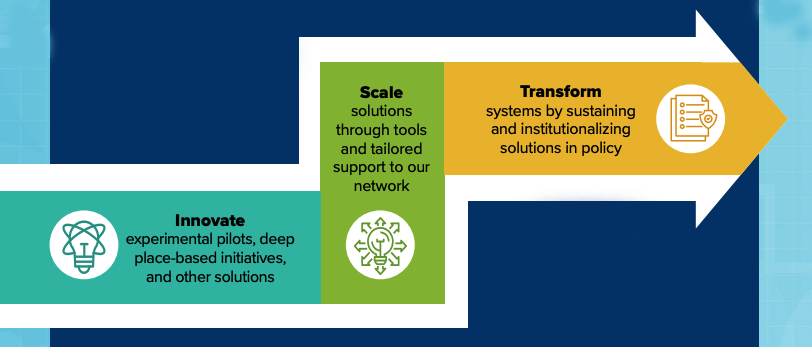We believe health systems must be reimagined as decarbonized anchors of healthier, resilient, more equitable communities that can survive and thrive in the face of a changing climate.
Health Care Without Harm has launched an ambitious strategic plan that will guide our work into the future. This strategy sharpens our focus and charts a course to transform the health sector in this pivotal time to better deliver on its core promise to "first, do no harm."
Our sights remain resolutely set on our North Star: a zero-emissions, climate-resilient, and equitable health sector. With this new strategy underpinning our efforts over three years, we will accelerate the realization of all that is possible when health care leads the way in healing people, communities, and the planet.
Our objectives
Together our powerful network will transform the health sector — ensuring it can balance the immediate needs for mitigation, resilience, and equity, while serving as a leader in the broader shift to a just, low-carbon economy.

Our theory of change
If we develop and deploy effective solutions and learnings across our networks, and if our partners adopt and act on these solutions and learnings, then we can achieve sustainable change and health sector transformation.
Our theory of change is designed to inspire action across the unparalleled networks we have cultivated over three decades.
- Innovate: We engage in experimental pilots and deep place-based initiatives to develop solutions through what we learn
- Scale: We scale our proven solutions through our network offering tools and tailored support
- Transform: We implement long-term systemic change through policy, market, and health system transformation
Our goals for health care
Our strategy is an important step forward in a much larger journey. We remain dedicated to the following near- and long-term outcomes:
- Mitigation: The health care sector reduces its emissions Our health care institution partners in the United States will collectively reduce their greenhouse gas emissions by 25% by 2026 using our suite of tools and tailored support. This level of emissions reduction lays the foundation for additional mitigation efforts in line with the Paris Agreement targets of 50% reduction by 2030 and net zero by 2050.
- Resilience: Climate-smart health care becomes standard throughout the world; net-zero, resilient health sector is increasingly the norm. By 2026, 50% (800+) of our health care institution partners in the United States will develop climate resilience plans using our guidance, enabling them to serve as essential anchors for community resilience in the unfolding climate emergency. 50% of our network would represent an important “tipping point” to move the U.S. health sector overall.
- Equity: Build at least 3 deep, place-based initiatives by 2026, using our anchor model of health systems and communities coming together to engage in equitable planning, decision-making, and solutions-building to directly address the disproportionate impacts the climate crisis has on underserved communities and the people who face the most risk.
Uniquely positioned for action
Hospitals and health professionals serve on the front lines of the climate crisis, bearing the cost of more frequent extreme weather events and changing disease burdens – while also being uniquely positioned to take a leadership role on climate action. As trusted messengers, health care professionals are reframing climate change as a threat to human health, educating their colleagues, patients, and communities. We work with health systems, clinicians, other nonprofits, government agencies, and businesses to ensure health and health care are integral to climate action at all levels and across all sectors. We strive to harness health care professional leadership to advance climate solutions and achieve ambitious health targets through win-win strategies that promote climate justice and health equity.
By leveraging its economic, political, and ethical clout – including its $4.5 trillion annual spending, more than 17% of the U.S. economy – the health sector exerts leadership and helps achieve the just transition to clean, renewable energy and a low-emissions, climate-resilient economy, thereby improving health outcomes, fostering greater health equity, and contributing to environmental justice for all.

Our powerful network
Over three decades, Health Care Without Harm has built the most extensive global network at the intersection of human and planetary health. This network offers our best chance for scaling and sustaining proven climate and health solutions.
- 1 in 4 health facilities in the U.S. including 1,700+ members with all 50 states and every type of hospital represented.
- 1,900+ global network members, representing 70,000+ hospitals and health centers in 86 countries.

